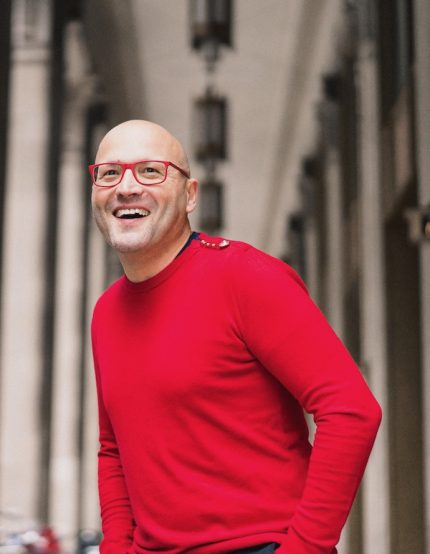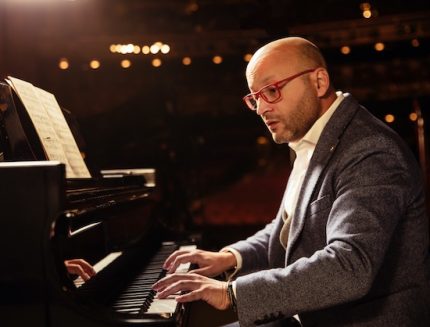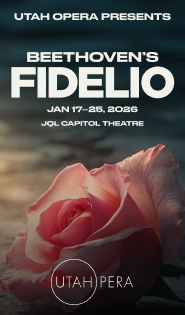Conductor Enrique Mazzola is passionate about bringing classical music to new audiences

For the first few months of the Covid-19 pandemic, conductor Enrique Mazzola was as frantic about the future as most of us.
“In March of last year,” he said, “when the cancellations started, of course, I had a feeling of frustration. After a couple of months, this sense of frustration became a reaction, a very beautiful artists’s reaction. We have to do something. We must react. We have to make music. Let’s make music. And from then on, I never stopped making music.”
Mazzola, the new music director of Lyric Opera of Chicago, will make his Utah Symphony debut this weekend leading the orchestra in Brahms’ Symphony No. 4, Verdi’s Overture to La forza del destino and Nino Rota’s Suite from La strada.
In late summer 2020, Mazzola was riding out the pandemic in his home in Montepulciano, Italy, a hill town in southern Tuscany. The pandemic was momentarily easing in Europe. He was able to travel for live performances at the Bregenz Festival in Austria and Zurich Opera in Switzerland. Over the ensuing months, he added scattered dates for virtual concerts with the Detroit Symphony, the London Philharmonic, the Dutch National Opera and a master class at the Bolshoi Theatre in Moscow. In August he conducted live performances of Verdi’s Luisa Miller at the Glyndebourne Festival in England. Everywhere he went, Covid-19 restrictions were seriously enforced.
“It was unbelievable,” he said. “I traveled a lot, always with double, triple masks. It was with reduced orchestra, reduced chorus. It was very difficult. But I did it. I could not stay at home. I really wanted to do it. I didn’t want to stop. We cannot stop.”
In September 2019, when Lyric Opera announced that Mazzola—born in Barcelona but thoroughly Italian—would succeed Sir Andrew Davis as music director, the path ahead seemed clear. Then 51, Mazzola had a thriving international career and had impressed Lyric audiences with performances of two bel canto operas: Donizetti’s Lucia di Lammermoor and Bellini’s I Puritani. He would spend two years as Lyric’s music-director designate. After conducting Luisa Miller at Lyric in October 2019, he would return for two operas the following season and take the podium as Lyric’s third music director in September 2021. Sporting his signature, very hip, red-framed glasses, his fast-paced English spilling out with a charming Italian lilt, he was infectiously enthusiastic about opera in general and Chicago in particular.
The continuing Covid pandemic completely upended those plans. Like virtually all U.S performing arts organizations, Lyric Opera shut down live performances in mid-March 2020 and canceled its entire 2020-21 season. But as Mazzola spent the early pandemic months in Europe, Lyric was constantly on his mind. He participated in planning virtual concerts for Lyric that aired this past spring: a set of six concerts exploring Rossini’s string sonatas featuring Lyric Opera Orchestra members, and a concert of highlights from Attila.
One of his happiest brainstorms was a series of short videos for Lyric’s YouTube and Facebook channels titled “Breaking Down the Score.” First posted last fall and still available, they feature Mazzola talking about Attila. The videos give Lyric audiences much more than a lively, impassioned explication of one of Verdi’s less-well-known early operas. Mazzola is in love with early Verdi operas, and, with his animated face and flying hands, he passes that love to his listeners.
“It was enjoyable because I wanted to do something for Lyric,” he said of the videos, made in spring 2020. “I was in Montepulciano, and my internet connection was really horrible. But I decided to take my iPhone, and I did it very homemade. I know they are full of flaws. When I had to send, sometimes it required five-six hours of internet connection. But I took my iPhone, and I said, ‘I will do it.’ Monday through Saturday I was taking care of my olive trees. And on Sunday, it was my Lyric Opera working day,” he said with a laugh.
Mazzola is making Chicago his principal home, and he arrived last October for four months to get acquainted with his new city. After conducting Luisa Miller at Glyndebourne last month, he returned to Chicago to start work on Lyric’s new season. In addition to Macbeth, which opened the company’s season last month, he also led performances of Donizetti’s The Elixir of Love (and will return in January for the Chicago premiere of Missy Mazzoli’s Proving Up).
“It was the period when I really settled down in Chicago,” he said of his extended stay last fall. “I found my supermarket, my dry cleaner. I bought my Ventra fare card. These are the kinds of things you need to know to live in a city. So, when I came back in mid-August, everything was set.”
But Chicago in October 2020 was radically different from the city he visited in fall 2019 as Lyric’s newly appointed music-director designate.
“There were no people on Michigan Avenue, and I remember I was really shocked,” he said. “When I arrived, I thought, ‘Okay, we have to do something.’ We cannot remain silent. Our mission as musicians is to say something, to bring comfort to the souls and hearts of people.”

For the past decade or so, Mazzola has focused on bel canto opera and Verdi’s early works. Macbeth continues an early Verdi cycle Mazzola plans for Lyric that began with Luisa Miller in 2019 and last season’s canceled Attila.
“With ‘Breaking Down the Score’ and the Attila highlights program, I consider that we’ve done Attila, so the cycle continues,” said Mazzola. “We’re doing the 1865 version of Macbeth, but it’s actually based on his 1847 version. What remains, a very good 60-70 percent, is 1847—early Verdi.”
Mazzola sees his career so far as a journey through 19th century Italian opera. “It’s a connection,” he said, “between my previous years when, in some ways, I highly specialized in bel canto opera. I feel very natural now going from bel canto to early Verdi and then going really into Verdi, the important repertoire. It’s a beautiful Italian operatic journey. In 12 years of my life, I’m living the development of Italian repertoire from the 1820s to the 1860s.”
But, as his Salt Lake City debut this week shows, Mazzola spends nearly equal time conducting symphony orchestras. He served as artistic and music director of the Orchestre National d’Ile de France from 2012-19.
“Conducting in [the opera house] pit is an extremely more complicated exercise. You’re in the pit, but you need to have a global vision. You need to know what’s happening in a small area like the pit. At the same time, you need to have control of the stage. Also, the ability to feel what’s happening backstage; very often there are sounds coming from backstage. So, it’s like multi-task conducting.
Once you rehearse a symphonic program very well, you have just the orchestra in front of you. There aren’t many variables. But of course, the good habits of symphonic conducting are that you care a lot about [such things] as bowing, the sound of the orchestra. It’s all about the care of the sound. And this is something I love so much to bring to people. All my symphonic experience, I bring into the pit.”
“During my previous seven years with the Orchestra National d’Ile de France, I was doing maybe 60 percent symphonic, 40 percent opera. Now. with Lyric, it will probably be the opposite. These are cycles in life. Of course, I will continue orchestral conducting, but I do not calculate whether I do more of this or less of that.”
Mazzola says he wants to open the entire world of classical music and opera to new audiences. In the wake of the social unrest following the murder of George Floyd last year, arts organizations like Lyric are seriously re-examining their mission. Forging stronger ties with communities far beyond their four walls has taken on new urgency.
“This is a very long-term idea,” Mazzola cautioned, “so I don’t want anyone to have any expectations that in two months we will have big diversity with huge numbers of people. This is long-term work, with doing good shows, with me exploring the city and possibly creating events in different communities.”
Engaging young people is a priority for Mazzola.
“I see that the ages between 20 and 40 are highly absent,” he said. “They think that opera is boring, opera is old. We have to show them that it’s absolutely not like this. When I talk with young people, it’s a problem of communication—the ritual, the black jacket and the bow tie. They think it’s a ritual for old people, and I really would like to change that.”
Younger audiences need to understand that opera is timeless storytelling, Mazzola said. He cites Elixir of Love, the comic tale of a bumbling young man wooing a pretty, headstrong young woman, as a case in point.
“It’s a comedy. It’s as enjoyable as watching Pretty Woman at the cinema. We’re speaking a language that is absolutely universal. When we speak about love—lost love, hopeful love—this is something we feel when we’re 15 years or 80 years old. This is life; we are storytellers. For three hours, two hours, you’re sitting at Lyric, and you stay there and forget about everything else.”
“I’m sure that every opera—from Götterdämmerung to Elixir of Love—has at least 30 seconds, one minute, of something happening onstage that happened in your own life. It could be a delusion in love, or tragedy or vengeance or rage. This is the most beautiful moment, when your heart starts to beat in the same tempo as the orchestra. This is something I would like to communicate to young people.”
Enrique Mazzola conducts the Utah Symphony in Brahms’ Symphony No. 4, Verdi’s Overture to La forza del destino and Nino Rota’s Suite from La strada 7:30 p.m. Thursday at UVM in Orem, and 7:30 p.m. Friday and Saturday at Abravanel Hall. utahsymphony.org


